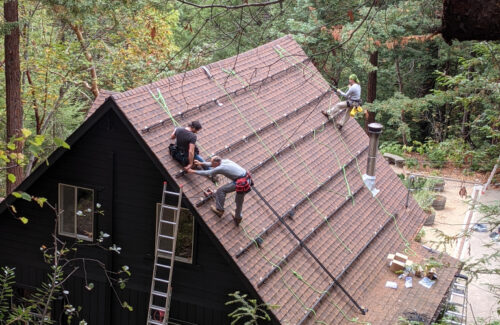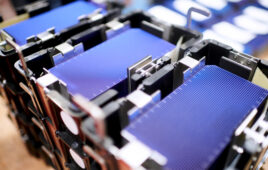By Mike Wiener, Marketing Manager, QuickBOLT
Shingle roofs are reliable and a roofing classic, but that doesn’t mean they are a flawless solution. Their installation allows for and often requires more roof penetrations compared to other roofing materials like tile or metal roofing. Despite all those nails and staples in the mix, shingles do their part in keeping the surfaces underneath them dry.

Credit: QuickBOLT
Solar mounting manufacturers often hear the question, “What about the roof warranty?” Most installers are just covering their bases, seeing what assurances they can get beyond their own quality of labor. What seems to trip everyone up is that most roof warranties are only assurance for the quality of manufacturing; assurance that the product was manufactured to the standard the manufacturer intended. So where do the lines get blurred?
To provide insight into the issue, we gathered warranty documentation from the nation’s most popular shingle manufacturers. First we will dive into common types of warranties.
Types of warranties
Any supplier worth its salt will offer a manufacturing or product warranty, ideally for a period matching how long it’s been in business; anything longer and the warranty period length is speculation. Most solar mounting manufacturers offer a 25-year warranty on their mounting solutions — this means they will replace products with defects attributed to the manufacturing process for up to 25 years past the manufacturing date.
A Service Warranty is a different type of offering that covers forms of labor. Truck rolls, crew size and subsequent warranty coverage are each a common components of service warranties. It’s rare to see a manufacturer offer a service warranty. That’s left to the secondary market full of insurance/solar warranty providers (like SolarInsure) who cover parts and labor on warranty claims.
The market
Now we’ll run through some manufacturers alphabetically and break down their warranties. Anyone not listed either could not be reached, does not provide explicit documentation addressing the question or fell outside the scope of our search.
Atlas Roofing
Atlas Roofing seems to be the first roofing company to address the issue of solar installations and roofing warranties. The company published an article in 2014 explaining how its warranty is impacted by solar installations.
Atlas recommended homeowners check with its home insurance providers to see if solar is covered, and for installers to offer a third-party warranty/insurance plan.
CertainTeed
CertainTeed is the rare case that offers a combined manufacturing/service warranty – under the right conditions. Its warranty coverage is tied into its credentialed installer program by benefitting contractors with two levels of coverage. When installed by “Credentialed” or “Master Installers,” Certainteed’s warranty covers any manufacturing defects and defects in workmanship for 15 or 25 years respectively. This makes for a very flexible offering only if you are a credentialed installer.
GAF
GAF warranties will remain in place if a solar system is installed over its roofing products. GAF released a technical bulletin a few years ago detailing the coverage and its limitations: If you need to remove the solar system for GAF to inspect the defective shingles, that cost is not covered by its warranty.
Malarkey Roofing Products
Malarkey offers a straightforward breakdown of its manufacturer warranty in a handy technical bulletin. Solar installations are allowed on Malarkey roofing and do not void its manufacturer warranty. But the bulletin states that “damage resulting from the installation of a solar/PV system does not constitute a manufacturing defect and is not covered by the warranty.”
Owens Corning
Owens Corning’s warranty is simple— the shingle warranties remain in place even when a solar system is installed. That warranty only covers manufacturing defects in Owen Corning’s own products, and the standard warranty doesn’t cover other manufacturers’ products.
Like GAF disclaimed, Owens will not cover the cost of removing a solar system to replace a defective roofing product covered by their standard warranty.
TAMKO doesn’t have any documentation addressing solar installation, but its technical team’s answer over a phone call was, “The roof warranty will remain intact” if PV is installed.
So, will your solar installation void the roof warranty?
Most likely, no, but that warranty never protected you or the homeowner from anything other than a defective roof product. At the end of the day, manufacturing warranties are not nearly as important as the quality of your own labor.
If you come prepared for the roof, then you can increase your chances of getting it right the first time. Taking direction from manufacturers is key to successfully using their products and installing a cohesive solar system. If you think you’ve got a better method, then let them know so they can develop a better product or adjust their instructions using your field experience.
Other ways to plan for a successful installation are by taking advantage of innovative mounting solutions — solutions that work with the roof and not against it. QuickBOLT has produced minimally invasive mounting solutions for a decade, and most of our peers in the mounting industry now offer their own top-mounted solutions.
The last three years have seen a major boon to over-the-shingle, top-mounted solar attachments which work to decrease the impact to the roofing materials beneath them. The fewer penetrations you make in the roof and the less you lift shingles, the better the roof integrity remains.
Someday soon we will witness the rapid decline of ripping up shingles, destroying the roof’s existing integrity and forcing installers to wonder with a pry bar in their hand, “Will this void the roof warranty?”





If solar panels are installed on a roof that was not built or qualified to withstand their increased weight, the guarantee may be nullified. To ensure that the warranty will not be voided and that the installation is done correctly to prevent any damage to the roof, it is vital to check with the manufacturer of the roofing and the solar panel installer. There may be specific warranties provided by some roof manufacturers for solar panel installations. To increase the building’s energy efficiency, energy-efficient roofing options like metal roofing, flat roofing options, and roofing automation and technology can be taken into account.
Don’t be fooled by this article. Not only will the asphalt shingle manufacturer’s warranty become void but any roofing company that offered a workmanship guarantee will also be void. A roofing manufacturer or installer would be crazy to offer any warranty on a roof system that is altered outside of it’s scope of original testing specifications and certifications. The homeowner or property owner usually finds out the hard way.
“If you come prepared for the roof, then you can increase your chances of getting it right the first time. Taking direction from manufacturers is key to successfully using their products and installing a cohesive solar system.”
It depends on the entities involved. I had a solar PV installation installed on my garage in 2017. The garage roof was blowing off in chunks when the wind was above 40 MPH. So, the roofing company replaced the roof with a “torch down system”, the solar PV company installed the stand offs and racking on the roof and the roofing company came back and performed a “torch down” sealing of the standoff mounts to ensure the roof was sealed with the solar PV array installed. With the many new roof installations systems available now, minimal penetrations with ease of the all weather 50 year silicon sealants can do an excellent job. The first problem people create for themselves is putting a solar PV system on a 30 year old asphalt roof, the second is going with a “no down” leased roof mount system, (always own your solar PV system), you don’t rent or lease your air conditioning, water heater, kitchen range, or dishwasher, why lease a solar PV system? Get three bids and vet each company for complaints to the BBB, ask for customer recommendations and actually “follow up” by calling these customers to find out their experience after the system was installed. This is a two part program, the roofing quality of coverings and the quality of the solar PV installation.